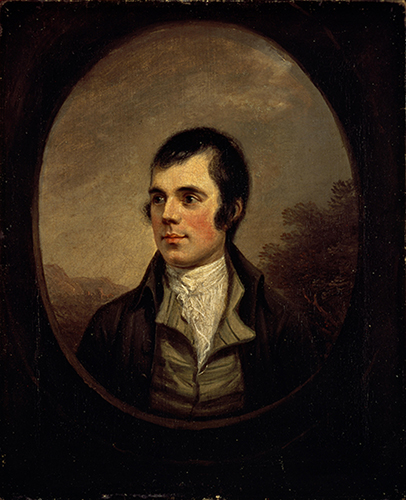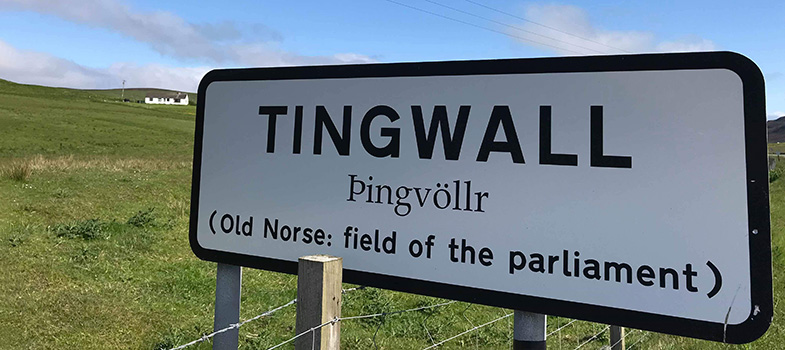5.3 Scots: A debate in parliament

An example of a motion in the Scots language put forward in the Scottish Parliament is the debate held on 25th January 2017 in the name of Emma Harper MSP (SNP) on 'Celebrating Burns and the Scots Language'. The motion is put forward and recorded first in English, followed by the Scots translation provided by the MSP.
However, in the following activity you will start the process at the other end and engage with the motion in the Scots language first of all.
Activity 7 
Part 1
Analyse the motion translated by Emma Harper into Scots and recorded by Bruce Eunson.
- a.Listen to the recording and take notes on the suggested action points.
- b.In a second step listen and read the transcript below at the same time, which can support your understanding.
- c.Can you identify the six things the motion asks the Parliament to do? Highlight these in the transcript. Then compare your highlights with ours.
Part 2
Now read the motion in the English language and check your understanding of the Scots version. Did you understand all action points correctly?
Motion S5M-03351: Emma Harper, South Scotland, Scottish National Party,
Date Lodged: 11/01/2017
Celebrating Burns and the Scots Language
That the Parliament welcomes the annual celebration of Scotland’s national poet, Robert Burns, which is held on 25 January each year to mark the Bard’s birthday; considers that Burns was one of the greatest poets and that his work has influenced thinkers across the world; notes that Burns' first published collection, Poems Chiefly in the Scottish Dialect, also known as the "Kilmarnock Edition", published in 1786, did much to popularise and champion the Scots language, and considers that this is one of his most important legacies; believes that the celebration of Burns Night is an opportunity to raise awareness of the cultural significance of Scots and its status as one of the indigenous languages of Scotland, and further believes in the importance of the writing down of the Scots language to ensure its continuation through written documentation, as well as oral tradition.
It is impressive to see and hear how many MSPs spoke passionately in Scots during the course of this debate. Emma Harper made a compelling plea for the Scots language when she spoke about her own life and the role Scots has played in it.
Activity 8
Read a transcription of Emma Harper’s explanation of why she put forward the motion and then summarise it in your own words.
Compare her experiences with those reported in the quote from Burns’ correspondence. What does using the Scots language mean to both?
"My mither tongue was Scots when I was a wee lassie; then, as I grew up, I lost a lot because it wasnae acceptable tae yaise the Scots words at scuil. I am rediscovering the mony words that I used as a wean that wernae yaised in scuil when I grew up on the ferm wi the other weans. We were happy tae get clarty when we louped the burns, jouked awa fae the kickin kye in the byre, managin tae hing on tae oor jammy pieces, which were clapped in oor wally naeves. I am saddened—it gars me greet—that, 40 years efter bein telt, 'Don’t speak like that—speak properly', I am now learning ma lost leid again".
Robert Burns was asked to avoid his Scots and, for the Kilmarnock edition, submit poems in English. In further correspondence to his publisher, George Thomson, when he was requested to write supplementary poems in English, Burns wrote:
- “If you are for English verses, there is, on my part an end of the matter ...
- I have not that command of the language that I have of my native tongue. In fact, I think my ideas are more barren in English than in Scottish.”
The Kilmarnock edition was printed in Scots. It did much to support, popularise and champion the Scots leid. I argue that we are richer for this decision.
Answer
This is a model answer. Your answer might be different.
Harper and Burns had the same experience – both were told that speaking/writing in Scots was not acceptable, it was not a ‘proper’ language. Both were asked to give up on an aspect of their identity.
Burns stated to he could not express his ideas adequately in English, and Harper tells us that she feels like crying when she considers that she is now, after 40 years of avoiding using Scots, rediscovering and learning her mother tongue again.
Burns refused to write in English and Harper thinks that printing Burns’ famous poetry collection in Scots has greatly enriched Scottish culture.
For Harper and Burns using the Scottish language is an aspect of their identity and cultural belonging.
5.2 Oath making and affirmation taking in Scots
